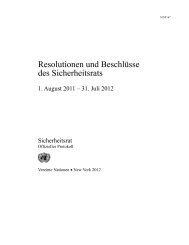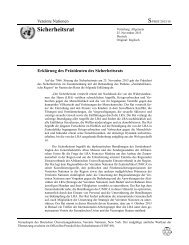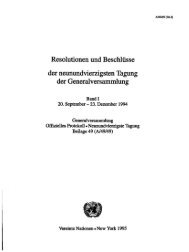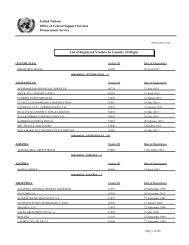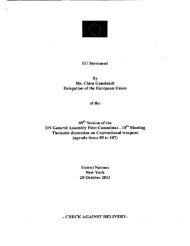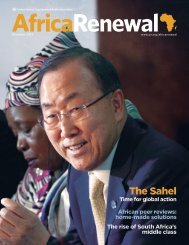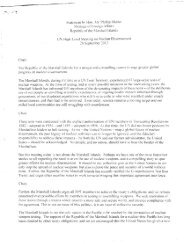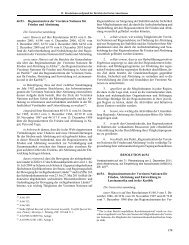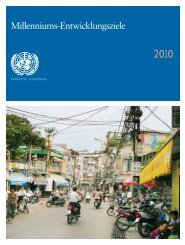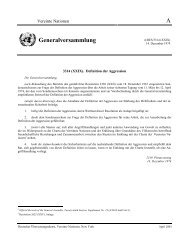Prevention and Response to Sexual Exploitation & Abuse in Liberia
Prevention and Response to Sexual Exploitation & Abuse in Liberia
Prevention and Response to Sexual Exploitation & Abuse in Liberia
You also want an ePaper? Increase the reach of your titles
YUMPU automatically turns print PDFs into web optimized ePapers that Google loves.
1.0 Introduction<br />
This note starts by describ<strong>in</strong>g the social, political<br />
<strong>and</strong> humanitarian context with<strong>in</strong> which SEA is<br />
be<strong>in</strong>g addressed <strong>in</strong> <strong>Liberia</strong>. The economic <strong>and</strong><br />
social vulnerability <strong>in</strong> <strong>Liberia</strong>n society widens<br />
the power differential between the large number<br />
of humanitarian workers <strong>in</strong> the country <strong>and</strong> the<br />
beneficiaries of their assistance, mak<strong>in</strong>g the<br />
latter highly susceptible <strong>to</strong> SEA. The overall<br />
vulnerability of a majority the population lends itself<br />
<strong>to</strong> the development of conditions <strong>in</strong> which SEA<br />
can flourish. As a result, the existence of SEA as<br />
a form of GBV has been recognized as a national<br />
problem <strong>and</strong> has been prioritized for action by the<br />
President.<br />
The ICN <strong>in</strong> <strong>Liberia</strong> has produced this paper <strong>to</strong><br />
showcase the significant progress that has been<br />
made <strong>in</strong> prevention <strong>and</strong> response <strong>to</strong> SEA, <strong>to</strong> identify<br />
challenges encountered <strong>and</strong> lessons learned <strong>and</strong><br />
<strong>to</strong> make recommendations for other countries <strong>to</strong><br />
take positive steps <strong>to</strong>wards reduc<strong>in</strong>g the risks<br />
<strong>and</strong> <strong>in</strong>cidence of SEA. The <strong>Liberia</strong>n context is<br />
unique both <strong>in</strong> its enabl<strong>in</strong>g fac<strong>to</strong>rs, which <strong>in</strong>clude<br />
political will, existence of government coord<strong>in</strong>ation<br />
networks, strong leadership from the ICN chair <strong>and</strong><br />
a dedicated post <strong>in</strong> the Resident Coord<strong>in</strong>a<strong>to</strong>r’s office<br />
of the UN Country Team, as well as its challenges<br />
<strong>in</strong>clud<strong>in</strong>g capacity constra<strong>in</strong>ts (human, logistical) at<br />
the county level, wan<strong>in</strong>g humanitarian aid flows, <strong>and</strong><br />
cultural/sexual norms that can detract from effective<br />
implementation of a national ‘zero <strong>to</strong>lerance’ policy.<br />
While there rema<strong>in</strong>s much more progress <strong>to</strong> be<br />
made, there is a need <strong>to</strong> document the experience<br />
<strong>in</strong> <strong>Liberia</strong> as a case study, as a contribution <strong>to</strong> the<br />
global efforts <strong>in</strong> address<strong>in</strong>g SEA.<br />
This paper will first describe the political <strong>and</strong><br />
humanitarian environment <strong>in</strong> the country, which<br />
provides the context for the various <strong>in</strong>terventions<br />
undertaken by the ICN. Next, the paper will<br />
describe the coord<strong>in</strong>ation mechanisms used, the<br />
<strong>in</strong>terventions undertaken <strong>and</strong> <strong>to</strong>ols developed<br />
for prevention of SEA, <strong>and</strong> the methods of<br />
moni<strong>to</strong>r<strong>in</strong>g <strong>and</strong> report<strong>in</strong>g. Each section will also<br />
note successes <strong>and</strong> challenges. The paper ends<br />
with a list of enabl<strong>in</strong>g <strong>and</strong> disabl<strong>in</strong>g fac<strong>to</strong>rs, with<br />
recommendations for countries that plan <strong>to</strong> utilize<br />
this case study as a guide <strong>to</strong> best practices.<br />
1.1 Social Context<br />
The Government of <strong>Liberia</strong>, with help from its<br />
partners, has made significant achievements<br />
over the past two <strong>and</strong> a half years, mov<strong>in</strong>g the<br />
nation along a path of recovery <strong>and</strong> rehabilitation.<br />
However, given the extent of destruction from 14<br />
years of civil strife, far <strong>to</strong>o many <strong>Liberia</strong>ns rema<strong>in</strong><br />
<strong>in</strong> a state of high vulnerability. Though enshr<strong>in</strong>ed<br />
1<br />
as basic rights for all, health care, safe water <strong>and</strong><br />
appropriate sanitation, shelter <strong>and</strong> education<br />
rema<strong>in</strong> out of reach for the majority of <strong>Liberia</strong>ns.<br />
As an overall consequence of the civil conflict <strong>and</strong><br />
economic decl<strong>in</strong>e, <strong>Liberia</strong> <strong>to</strong>day is amongst the<br />
world’s least developed countries <strong>and</strong> the country’s<br />
socio-economic <strong>in</strong>dica<strong>to</strong>rs are amongst the worst.<br />
Poverty <strong>in</strong> <strong>Liberia</strong> is pervasive, with an estimated<br />
80 percent of all households suffer<strong>in</strong>g from <strong>in</strong>come<br />
poverty. Around three-quarters of the population<br />
lives on less than US $1 per day <strong>and</strong> approximately<br />
90 percent of the population is considered food<br />
<strong>in</strong>secure.<br />
Overall primary school enrollment is low; 37% of<br />
girls are enrolled compared <strong>to</strong> 38% of boys. Net<br />
high school enrollment is even lower (16% male<br />
<strong>to</strong> 14% female). There is a large gender disparity<br />
<strong>in</strong> adult literacy rates, 69% for men <strong>and</strong> 41% for<br />
women.<br />
Furthermore, women lack equal opportunities <strong>to</strong><br />
skills tra<strong>in</strong><strong>in</strong>g <strong>and</strong> economic assistance, as well as<br />
employment opportunities <strong>in</strong> both public <strong>and</strong> private<br />
sec<strong>to</strong>rs. Consider<strong>in</strong>g that women lead many<br />
<strong>Liberia</strong>n households, this has a significant impact<br />
on many families’ ability <strong>to</strong> cope.<br />
There are high rates of sexual <strong>and</strong> gender-based<br />
violence, particularly <strong>in</strong>volv<strong>in</strong>g child victims, <strong>and</strong><br />
harmful traditional practices <strong>and</strong> beliefs that affect<br />
the rights (<strong>in</strong>clud<strong>in</strong>g reproductive health rights) of<br />
women <strong>and</strong> girls are prevalent. Rape is the number<br />
one crime reported week after week <strong>in</strong> UN Crime<br />
statistics, which reflect the national trend. Many<br />
survivors of sexual violence <strong>and</strong> exploitation are<br />
unwill<strong>in</strong>g <strong>to</strong> look for medical or psycho-social<br />
assistance, or <strong>to</strong> report the assault <strong>to</strong> the police<br />
because of the associated stigma.<br />
There is a fragile <strong>and</strong> barely functional justice<br />
system, a lack of correctional facilities, <strong>and</strong> an<br />
<strong>in</strong>experienced newly recruited police force, which<br />
lacks logistical necessities as well as community<br />
trust. With<strong>in</strong> this context, effective response <strong>to</strong><br />
sexual gender based violence (SGBV), which<br />
requires specialized knowledge <strong>and</strong> skills, poses<br />
seem<strong>in</strong>gly overwhelm<strong>in</strong>g challenges. Until law<br />
enforcement <strong>and</strong> judicial <strong>in</strong>stitutions become fully<br />
functional, protection issues will rema<strong>in</strong> a serious<br />
humanitarian concern <strong>in</strong> <strong>Liberia</strong>.<br />
1.2 Government <strong>Response</strong><br />
The Government of <strong>Liberia</strong> (GOL) commitment <strong>to</strong><br />
address the high prevalence <strong>and</strong> endemic nature<br />
of GBV, especially sexual gender based violence<br />
(SGBV), is also reflected <strong>in</strong> its recently completed<br />
Poverty Reduction Strategy (PRS 2008-2012),



